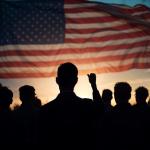Tribulation Force, pp. 258-265
Rayford Steele flies into O'Hare International Airport, then drives home, eats some Chinese take-out and goes to Bible study. Buck Williams eats some Chinese take-out at Rayford's house, goes to Bible study, then drives off to O'Hare International Airport. While Rayford is at the airport, Buck is on the phone. While Buck is at the airport, Rayford is on the phone.
That is all that happens in these pages. Less than that, actually, since we're never told anything about what happens at Bible study.
Buck manages to squeeze three phone calls into these seven pages, but like the rest of what we read here these do nothing to advance the plot or to reveal character. Two of the calls are to arrange the details of his flight(s), the other, to Chloe, is to arrange the details of their dinner date.
This obsession with airports is an expression, I think, of the odd notion in corporate America that flying around a lot means you're really important and valuable. That doesn't apply to lower-echelon employees like salespeople or trainers — the people who really do need to physically travel from place to place. But there's a certain kind of executive travel that mainly just serves to assert that the executive in question is so valuable to the company that it's worth hundreds or thousands of dollars to shuttle him about just to allow workers in many different places to bask in the glow of his physical proximity. "I have a meeting in Chicago," the executive says, by which he means, "There is no one in all of Chicago who can do what I do. I am Very Important."
That, I'm guessing, is the same message Jerry Jenkins is trying to convey about our heroes. And so he has them, just like those executives, flying around a lot instead of actually doing anything worthwhile.
Jenkins reinforces this message with the usual random praise for our heroes from peripheral voices. For Rayford this comes from the news anchor on the in-flight TV. The anchor briefly discusses some minor stories about the unification of the world's currency and the formation of a global military (Nicolae's brilliant plan to restation the world's navies in the Iraqi desert) then segues into a report on the big story that everyone seems to be talking about:
Rayford saw a brief special on the new Air Force One, a 757 which would be delivered to Washington's Dulles Airport and then flown to New York to await its official maiden voyage under the control of "a new captain to be announced shortly. The new man has been culled from a list of top pilots from the major airlines."
The obsessive media attention paid to the crew of Air Force One* has become an unintentional running gag in this book. But then almost every aspect of what does or does not constitute "news" here is hilariously strange. The disappearance of every child on the planet is now hum-drum old news — even though Buck's article on it has yet to hit newsstands. But a rabbi's studies of the scripture merits a press conference. And an interfaith gathering is seen as the stuff of special bulletins:
In other news, Carpathia was quoted as saying that he and the ecumenical council of the meeting of religious leaders from around the world would have an exciting announcement by the next afternoon.
I think the suggestion of an exciting announcement from an ecumenical council involves some kind of oxymoron. Try it yourself. Try saying, "Hey! There's going to be an announcement from the ecumenical council!" without making those exclamation points sound sarcastic. Can't be done.
The authors' strange idea that an "ecumenical council" would be big news probably arises, in part, from their reading lots of the sort of religious right newsletters in which such things are treated as big news. Beverly LaHaye's Concerned Women for America tends to treat the Parliament of World Religions as though that group was not just a forum for dialogue amongst the faiths that share this planet, but as though it was an actual parliament — a legislative body making binding legal decisions to reshape the doctrines of the various faiths. That's nonsense, of course, a very similar nonsense to the sort of weird federation-of-planets notion that Tim LaHaye has of the United Nations.
(Whether or not the folks writing such nonsense for the CWA action alerts really believe it or not is hard to tell. I'm afraid that by now they probably do. I think at first they knew they were misrepresenting interfaith respect as syncretism just because it made an effective fundraising pitch, but over time I think they came to believe their own lies and embellishments, forgetting that the stories they're now so scared of were originally just scary stories they made up to rally the faithful into writing checks. See also: The Homosexual Agenda.)
The random unsolicited praise for Buck comes from the assistant to the pope-apparent, who informs him that "the cardinal had been so impressed with Buck's interview of him for the soon-to-appear cover story."
It seems Peter Mathews, the soon-to-be-last pope, has forgiven Buck for slamming him with Ephesians 2:8-9 and pwning him Luther-style on the evils of good works. The cardinal is so fond of Buck, the assistant says, that he's agreed to a second interview if Buck will join him on his flight the next morning from Cincinnati to New York.
Thus we have Buck first flying from Chicago to Cincinnati tonight — all part of Jenkins' plan to have the next two chapters of the book set mainly in airports and airplanes.
Cincinnati is only a five-hour drive from Chicago, just long enough for Buck to get a substantial look at the landscape of post-Event America. But of course, the authors aren't interested in exploring post-Event America. That's why Chloe's miraculous trip home from Stanford the day after the Event was never described and she never speaks of it. And anyway, Buck can't drive to Cincinnati — important people like Buck always fly.
You're forgiven, by the way, if you had forgotten that Chloe was ever a college student out in Silicon Valley. Chloe and the authors seem to have forgotten that too. Thus we're treated to a scene in which Buck shows Chloe how to use the Steele's home computer, which we're told she did not know how to use and which "had not been turned on since the week of the disappearances," despite Chloe's new job conducting "research" for Bruce.
Within a few minutes, Buck had Chloe connected to the Internet and set up with an e-mail address. "Now you can reach me anywhere in the world," he said.
Chloe is apparently dazzled by Buck's manly navigation of AOL (this was written in 1996, remember).**
This happens after their Chinese take-out dinner, during which we are told that Buck and Chloe conduct a deeply meaningful and meaningfully deep conversation.
Buck and Chloe sat in the kitchen, eating and talking for more than an hour. They talked about everything — their respective childhoods, families, major events of their lives, hopes, fears and dreams.
A few pages earlier, when they were talking on the phone, Jenkins provided a page-long transcript of their entire conversation detailing the logistics of their planned dinner meeting. Chloe also told Buck, at length, about her father's decision to pilot the flight to Israel — we readers already knew about that, but we hadn't yet had the pleasure of hearing it repeated for Buck's benefit.
Redundant exposition and logistics we always get to read word-for-word. But
when two characters have a conversation about their "hopes,
fears and dreams," all we are told is that this conversation took place. We know nothing more about their hopes, fears and dreams than we did at the start of the book.
Jenkins' rule for dialogue seems to be that every logistical matter must be discussed aloud by his characters, but anything that might reveal who those characters are ought to be left unspoken and unwritten, only summarized in the most generic terms possible. Jenkins is so intent in this scene not to allow readers to eavesdrop that he brings Rayford in to meditate, again, on the candies from Hattie:
Rayford left Buck and Chloe … and examined the mints. … Rayford decided they had not been tampered with, and even if they had come from Hattie Durham for some inexplicable reason, there was no sense in not enjoying them.
This all takes place seamlessly within a passage otherwise written from Buck's point of view. There are no visual cues (none of the line breaks or horizontal lines Jenkins usually uses) and nothing in the text to transition in or out of this paragraph inside Rayford's head, inserted in between two paragraphs inside Buck's. It creates the strange impression that Buck, somehow, can read Rayford's mind.
No section of Tribulation Force would be complete without at least one howling reminder that the authors and their characters are completely disregarding the effects of the Event that's supposedly our story's premise. That line here involves Buck's trip to the airport:
Buck and Chloe left the Tribulation Force meeting early to get to the airport. Traffic was lighter than he expected, and they arrived more than an hour before his flight.
What does it mean to live in a world without children? What does it mean to live in a world wracked by the trauma of two billion friends, neighbors, relatives and strangers disappearing in an instant without explanation?
Well, for one thing, less traffic.
As they walk into the airport, Chloe reassures Buck that she will be perfectly safe walking back to her car, alone, late at night:
"I've done it lots of times," she said. "There are a lot of security guards."
So again we see that the nihilistic anarchy of the godless, depraved post-Event world is rather flexible.
The authors' inconsistency on this point is probably mainly just sloppiness — consistency requires a sustained attention that Jenkins doesn't care to provide. But I think there are a couple of other reasons that their supposedly depraved, godless, lawless world comes across as so harmless and benign.
Christian-branded fiction isn't allowed to contain even a suggestion of sex or violence. We're reminded of these stricter-than-G-rated restrictions again during their walk into the airport:
He lugged his leather over-the-shoulder case with his whole world in it. Chloe seemed awkward, but Buck had nothing for her to carry, and they weren't at the hand-holding stage yet, so they just kept moving. Every time he turned so she could hear him, his bag shift and the strap slipped off his shoulder, so they eventually settled into a silent trek to the gate.
So world-traveler Buck needs to get some better luggage.
He also needs to stop obsessing over the propriety of premarital hand-holding. This fixation on sexual morality winds up hypersexualizing everything. Holding hands is not sex. It's not even sex-ual. But in the RTC moral code that Buck magically internalized upon conversion, all affection is sexual. For Buck and the authors and the formal and informal censors at Tyndale House publishers, holding hands is lascivious.
That's perverse. Or, at best, immature. There's something junior-high-ish about Buck's apparent notion that hand-holding constitutes first base (second base: holding hands with fingers interlaced). And if that seems like naive innocence to you, then you don't know what it means to be a boy in junior high.
A book that regards premarital hand-holding as controversial isn't a book that can easily accommodate any real exploration of what a depraved mob of godless, lawless, nihilist criminals might be up to. Nor will authors accustomed to this mode of thinking be very capable of imagining such a scene.
Think way back to Bruce's description of himself as a "good" visitation pastor, apart from the occasional peek at a Playboy. That ogling was portrayed as a particularly grievous sin. Bruce's habit of blowing off hospital visits wasn't regarded as quite so serious an offense (this despite, you know, "I was sick and you did not visit me"). The authors don't appreciate the depravity of depraved indifference. So since they're not allowed to portray any depravity that involves sex or direct violence, and since they cannot imagine any depravity apart from that sort, they wind up giving us a depraved, lawless, post-Event world in which walking alone through a dark parking lot never seems dangerous.
The awkwardness of our couple's "silent trek" through the airport gives way to some even more awkward attempts at flirtation. This isn't all bad, but the parts that are bad are so skin-crawlingly bad that we'll just skim right past and save our strength for the more intense flirtation in next week's passage. (Buck and Chloe bond over airport cookies. Again. Because attempting to recreate an earlier moment of happy spontaneity always works so well.)
If Buck and Chloe are at the airport, then Rayford must be on the phone. And if he's not on the phone with Buck or Chloe, then he must be talking to either Earl or Hattie, because those four are the only people Rayford ever talks to.
It's Earl. He's calling Rayford because he just got off the phone with Hattie. "Is that the same Hattie Durham who used to work for us?" Earl asks Rayford.
"One and the same."
"She's Carpathia's secretary?"
"Something like that."
"Small world."
Very, very small.
– – – – – – – – – – – –
* I don't recall ever seeing a single news story on the pilot or crew of Air Force One, let alone this kind of breathless blow-by-blow coverage. I suspect that may change next year, though, if the Republican Party regains control of the House of Representatives in November. That's sure to bring us weeks of relentless stories on the "PlaneGate" controversy arising from the discovery that one of the assistant baggage-handlers on the president's plane is Muslim or homosexual or something. Weeks of subpoenas, depositions and congressional hearings will dominate the news until the non-scandal of PlaneGate eventually fizzles out, replaced by TomatoGate and the ensuing congressional investigation into whether Michelle Obama is violating child-labor laws by allowing schoolchildren to volunteer in the White House vegetable garden.
(No, I'm not looking forward to 2011. I remember the silliness of the Clinton years and this promises to be much, much worse.)
** The Internet will come to play a larger role in subsequent books, but here in Tribulation Force it's just another missed opportunity. I'm picturing Chloe and Rayford surfing Christian chat rooms — all eerily silent since being abruptly abandoned mid-thread three weeks ago. Then they stumble across a chat room on End Times prophecy, with the same question posted repeatedly, every few hours, without reply: "Is anyone else out there?"
That sort of thing would have allowed the authors to introduce a desperately needed new voice from somewhere else in the world. Plus just think of the possibilities in terms of the fantasy wish-fulfillment at the core of these books. The
new character could be a former atheist
troll who had frequented the Rapture Prophecy chat room just to mock and pick fights. What better vehicle for illustrating the authors' main message of "You'll see, someday soon, when we're all raptured and you're left behind!"
Beyond that, though, the form of chat-room transcripts could provide a deliciously creepy structure for a story on the aftermath of a premillennial dispensationalist apocalypse. Or a zombie apocalypse, for that matter. The tale of a zombie apocalypse told entirely through chat-room transcripts could be very creepy indeed. (I'm thinking of something like Night of the Living Dead meets Balin's journal from Moria.)
















